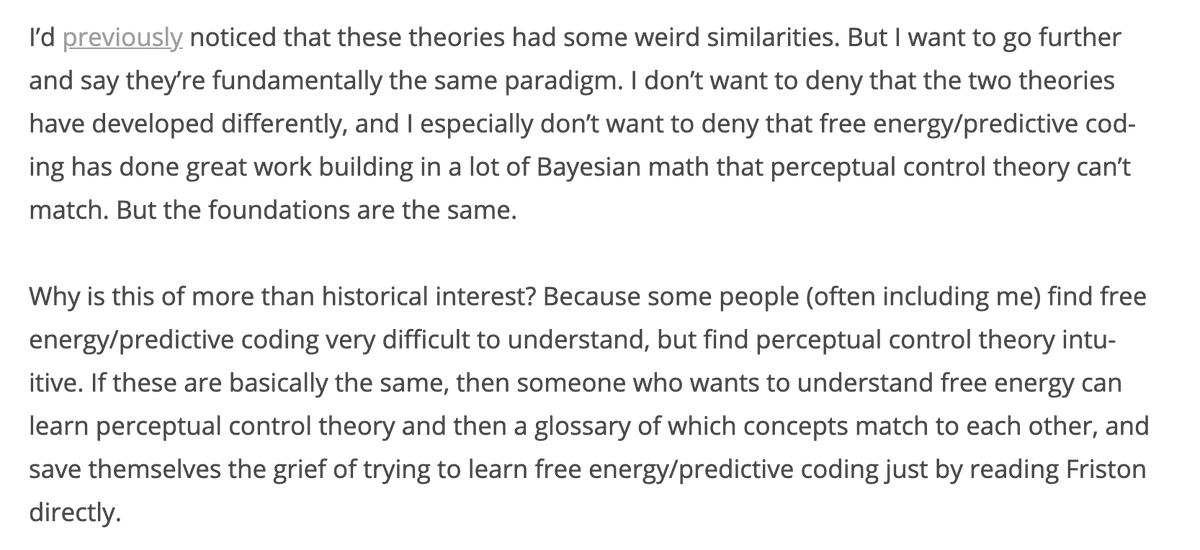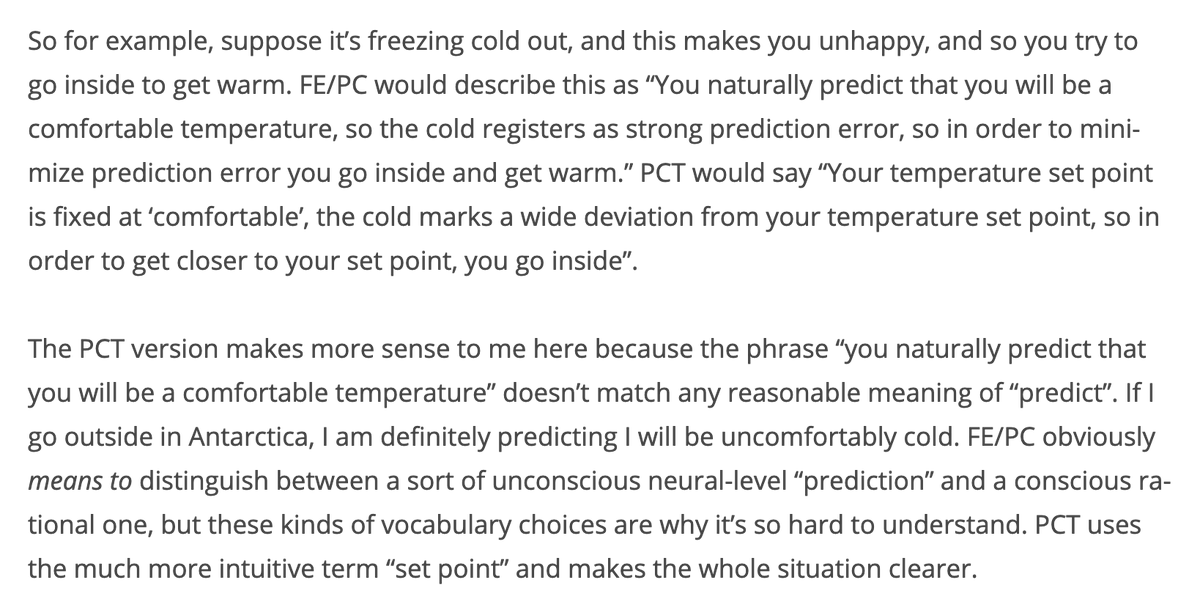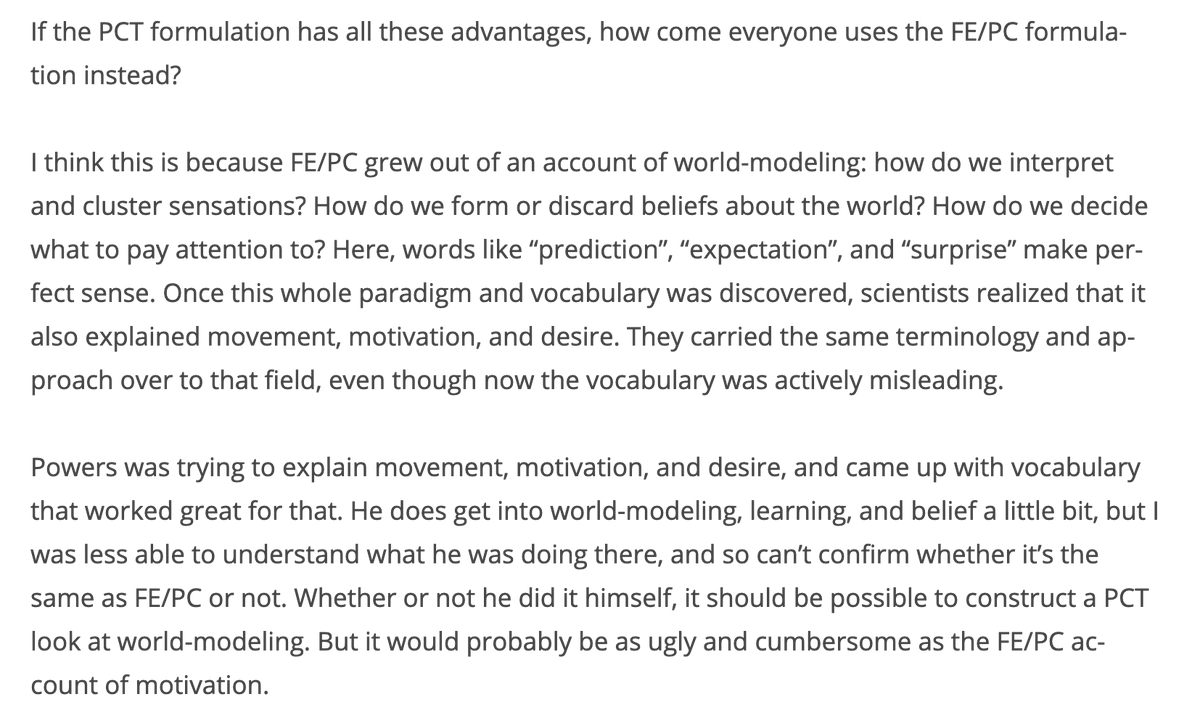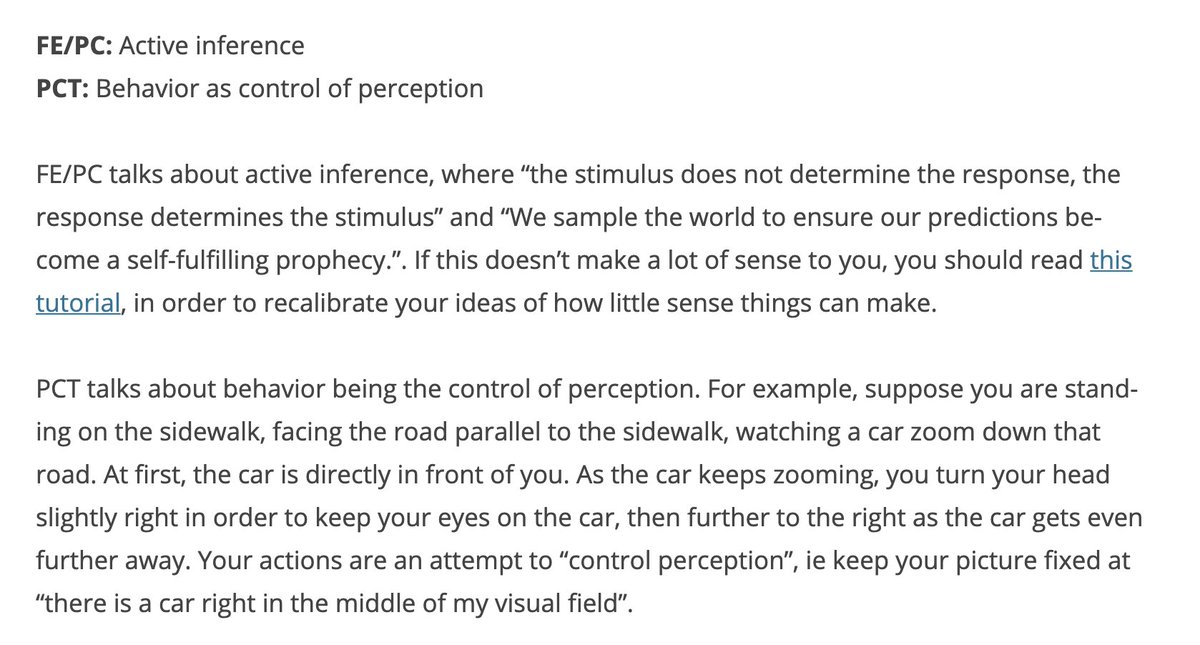
🧵 research blog for Perceptual Control Theory (PCT) ⚡️⚖️🌡💪🤖
this thread also inspired by thinking about PCT since it would seem that desires emerge as like the alluring voices of higher-level control systems that aren't transparent to consciousness
https://twitter.com/meekaale/status/1384754190438879232?s=20
this also makes it a bit weird to talk about "subconscious" because this kind of higher-level control feels more like "superconscious" as in these processes are "above" or "transcendent"
I read Slate Star Codex review of the original 1970s book by Will Powers slatestarcodex.com/2017/03/06/boo…
oh, so perceptual control is an older ancestor of "predictive processing", that's why it feels so familiar
I'm kind of trying to speedrun the past few years of rationalist zeitgeist theory exploration I guess
slatestarcodex.com/2017/09/06/pre…
I'm kind of trying to speedrun the past few years of rationalist zeitgeist theory exploration I guess
slatestarcodex.com/2017/09/06/pre…
Scott Alexander says "PCT is a good model, but what’s good about it is that it approximates PP. It approximates PP best at the lower levels, and so is most useful there; its thoughts on the higher levels remain useful but start to diverge and so become less profound."
ok, later he says PCT is just a lot easier to understand than the obscure Bayesian free energy babble 

I guess I appreciate how PP uses predict in a weird way; it's kind of nice because these theories themselves seem to weirdly invert the typical picture of perception and action; there's a similar weirdness in the notion of "controlling perceptions" 

like, the first instinct is to say "how can you control perceptions, perceptions are just what you receive from the world, you can only control your actions" but no, actions are what you USE to control perception, i.e. to get the experience that you want
reflecting on a thought about exercise and exertion and intentional work
https://twitter.com/meekaale/status/1384595760520564737?s=20
I think there should be a way to talk about Alasdair MacIntyre's view of action, narrative, and virtue with the PCT framework, and I think this would be very interesting
https://twitter.com/meekaale/status/1384597854115749888?s=20
MacIntyre says the intellectual culture has problems understanding how actions aren't atomic but parts of larger structures that must be understood narratively, and that you can't understand your life unless you see the narrative structures in which you're embedded
PCT seems to agree that there are no atomic actions, it's all just different levels of control that bottom out in muscle activation but emanate from higher levels, that life is a continuous fractal unfolding
here the "predictive" framework also seems like a good vocabulary, because narrative is all about predictive processing: expectations, obligations, debts, setting things straight, correcting mistakes, etc
so basically I suspect that keeping in mind something like MacIntyre's account of action, narrative, social life, and ethics will be a good way to understand and maybe engage critically with these "cybernetic" theories 

when MacIntyre says "deprive children of stories and you leave them anxious stutterers in speech and action" I think that is resonant for the same reason that Scott Alexander finds PCT an excellent novel explanation for tremors
hearing stories is like training a repertoire of narratives that exemplify how high-level errors can be propagated through down to speech and action, and this cultural learning is as important as learning how to talk and walk
this whole PCT thing points very exactly to what I've been trying to get a handle on, like in this thread from January:
https://twitter.com/meekaale/status/1347109964008071169
this thread on goals as horizons is also very PCT adjacent
https://twitter.com/meekaale/status/1345335412517175296
and this thread about flow, decisions, activity, which goes into top-down & bottom up and then turns to religious ideas like God, sin, karma, nirvana, before coming back to ADHD
https://twitter.com/meekaale/status/1347445677715054592
back in January also thinking about MacIntyre and the linking between top-down and bottom-up, ADHD and social structures, etc etc, feels good to reconnect with this "research project" with a new lens
https://twitter.com/meekaale/status/1347126135407181829
hey @Malcolm_Ocean have you seen anyone applying PCT-like frameworks to ADHD?
from "The Interdisciplinary Handbook of Perceptual Control Theory":
"Surely there must be a way to link higher level thoughts with moment-to-moment action?"
yes, that's what I worry about every day after breakfast
"Surely there must be a way to link higher level thoughts with moment-to-moment action?"
yes, that's what I worry about every day after breakfast

MacIntyre criticizing not only behaviorism but the whole notion of behavior as separate from multiscale intentional arcs; PCT criticizes behaviorism in a similar way
https://twitter.com/meekaale/status/1384954902447894533
woodworking, controlling the environment, Elaine Scarry and alienation
https://twitter.com/meekaale/status/1386201870830551040
agency, sympathy, solidarity, engagement, engine & drivetrain, Napoleon
https://twitter.com/meekaale/status/1387280753143259136?s=20
• • •
Missing some Tweet in this thread? You can try to
force a refresh






